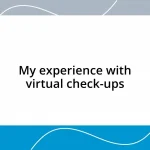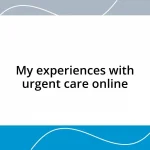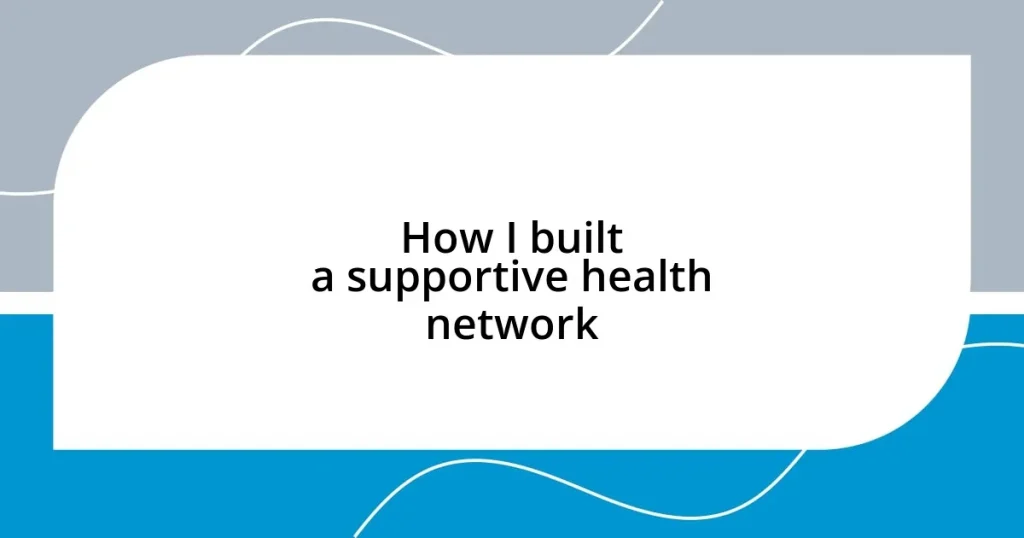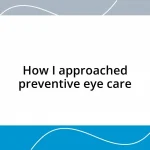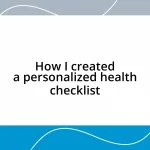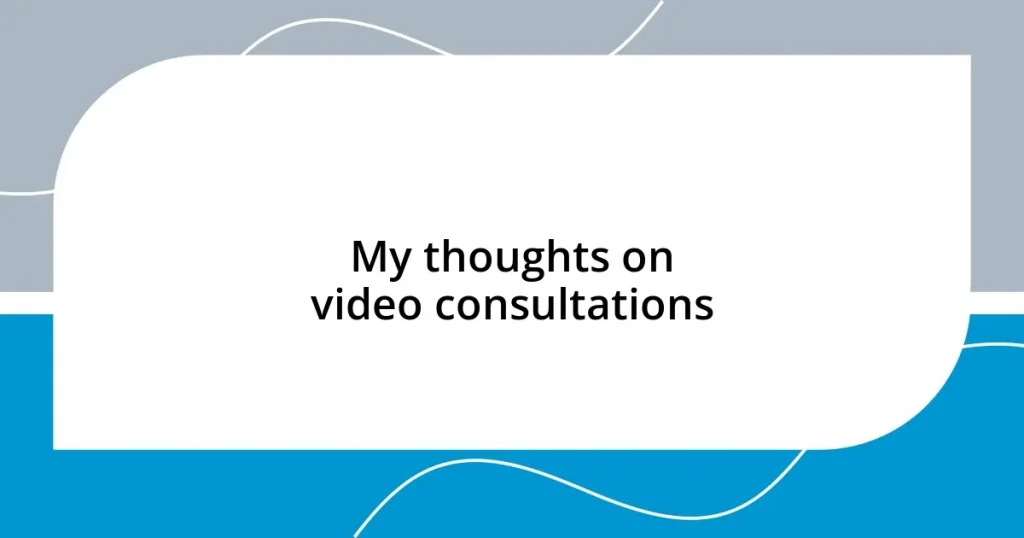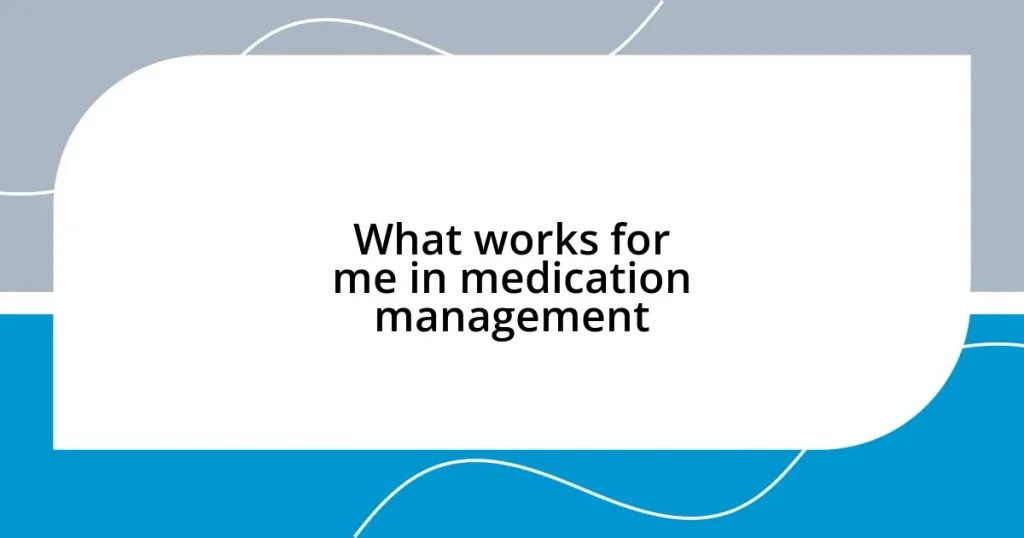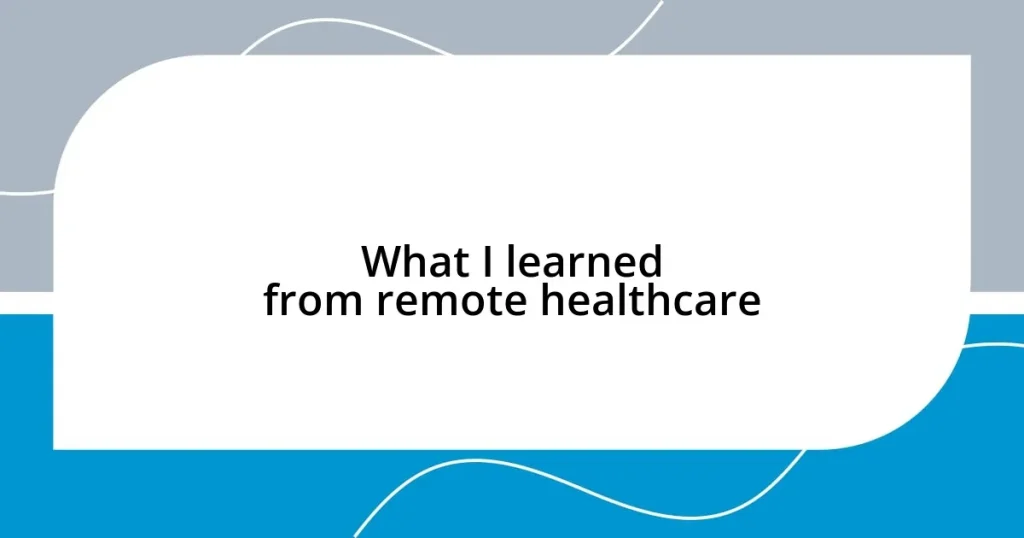Key takeaways:
- Building a supportive health network requires open communication among healthcare providers to ensure comprehensive care.
- Identifying personal health needs through self-reflection helps determine the right support systems and goals.
- Connecting with like-minded individuals and utilizing online platforms can enhance emotional support and resource sharing.
- Maintaining relationships in your support system involves regular check-ins, open communication, and evaluating the effectiveness of those connections.
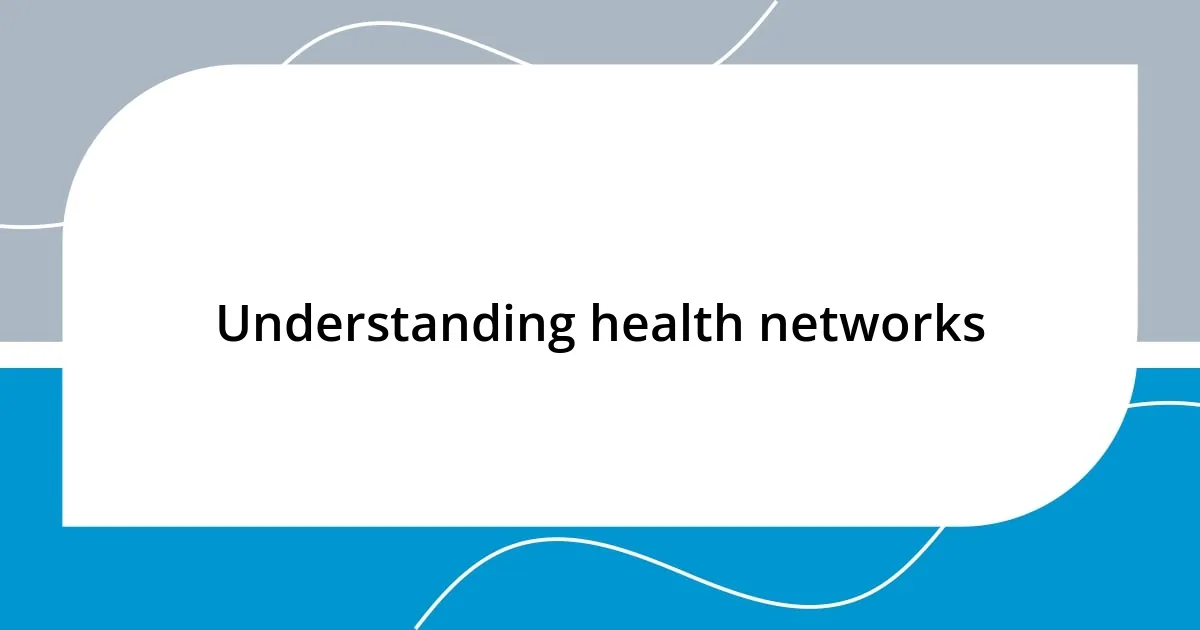
Understanding health networks
Understanding health networks is all about recognizing the interconnected relationships between various healthcare providers, specialists, and support services. When I first stepped into this vast landscape, I was overwhelmed—how could I navigate through doctors, therapists, and wellness coaches? It felt like I was piecing together a puzzle, where every connection often seemed vital to my overall well-being.
As I began to form my own health network, I realized the importance of having open lines of communication. For instance, one healthcare provider didn’t always understand the medications prescribed by another, which could lead to confusion. I vividly remember a particularly frustrating appointment when I asked my doctor about a new side effect I was experiencing, and it turned out my pharmacist had a crucial piece of information that neither of us had considered. Have you ever felt stuck in the middle like this? It’s a reminder that our health isn’t just a top-down approach but a community effort.
Building a supportive health network also means finding the right people who understand and champion your needs. I once shared a conversation with a fellow patient, and her insights about a local support group transformed my perspective. It made me think—are we tapping into the collective wisdom of those around us? Those genuine connections and shared experiences can often lead to unexpected support and solutions, proving that together we can create a stronger, healthier community.

Identifying your health needs
Identifying your health needs is a vital first step in building a supportive health network. I remember sitting down with a journal, detailing everything I felt, from aches to fatigue. It wasn’t just about physical symptoms; I had to consider my emotional and mental well-being as well. This practice of self-reflection helped me visualize what I truly needed to thrive.
To pinpoint your health needs, consider these essential aspects:
- Physical Health: Assess any chronic conditions, recent illnesses, or discomfort.
- Mental Well-being: Reflect on your emotional state, levels of stress, or anxiety.
- Support Systems: Identify family and friends who can be part of your journey.
- Lifestyle Habits: Think about your diet, exercise routine, and sleep patterns.
- Goals: Define short-term and long-term health goals that resonate with you.
Understanding your health requirements is not just a checklist; it’s an intimate journey. Each insight can shine a light on your next steps. During one particularly eye-opening session, I realized that my recurring headaches were often linked to my anxiety. Recognizing that connection prompted me to seek not just a doctor, but also a therapist—saving me from the cycles of confusion I had previously experienced. Embracing this deeper understanding of myself was indeed empowering.
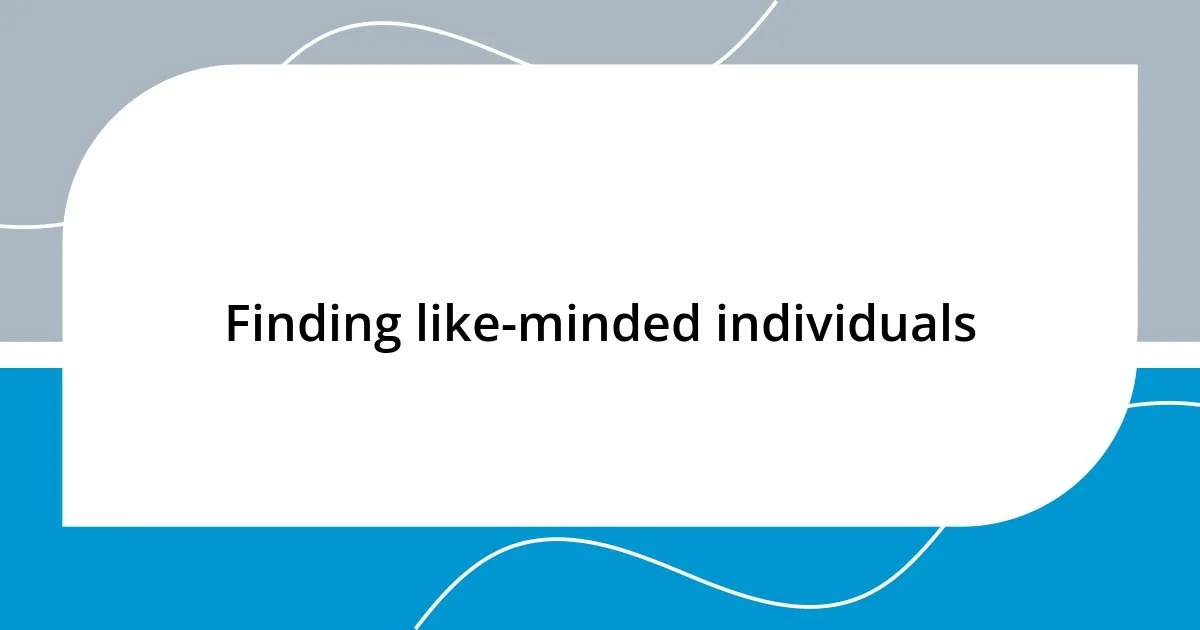
Finding like-minded individuals
Finding like-minded individuals is essential for fostering a supportive health network. In my journey, I often turned to community events and local health fairs to connect with others grappling with similar challenges. One notable experience was meeting a group of individuals at a wellness workshop, where sharing our stories and insights not only made me feel less alone but also opened doors to numerous resources I hadn’t previously considered. Have you ever met someone and felt an instant connection? Those encounters often spark invaluable relationships.
Online platforms can also be a treasure trove for finding individuals with shared experiences. After joining a few health-related forums, I felt a surge of camaraderie. One conversation that stuck with me involved a member discussing their journey with a chronic illness. Not only did their story inspire me, but it also encouraged me to initiate deeper conversations about holistic care options in my life. Have you explored social media for support groups? The digital landscape can be a welcoming space for connection.
While it’s vital to find like-minded individuals, I’ve discovered the importance of nurturing these relationships actively. One of my closest friends, whom I met through a local support group, has become my accountability partner in adopting healthier lifestyles. Together, we share recipes, workout ideas, and emotional support as we navigate our health journeys. Having someone to celebrate progress with or troubleshoot setbacks can significantly enrich our experiences. What’s your approach to building these supportive relationships?
| Benefits of Connecting | Examples |
|---|---|
| Emotional Support | Sharing personal stories at group meetings. |
| Resource Sharing | Discovering new health apps or tools in discussions. |
| Accountability | Partnering for exercise and wellness challenges. |
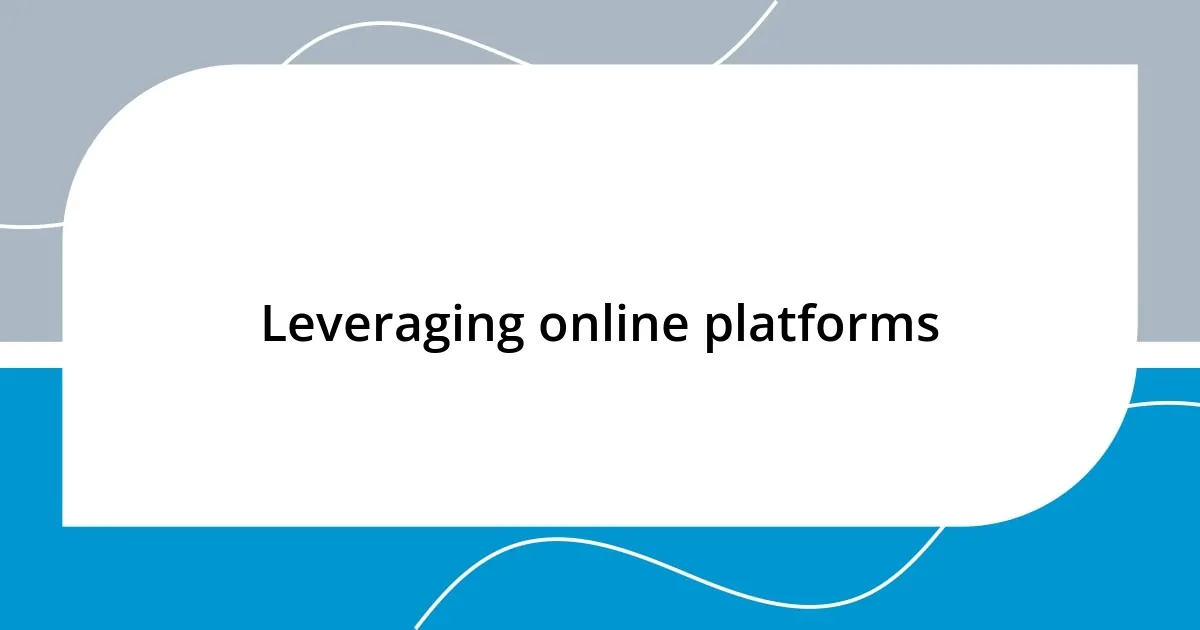
Leveraging online platforms
Leveraging online platforms can significantly enhance your journey toward building a supportive health network. I vividly remember signing up for a wellness app, hoping to track my progress. What surprised me was the vibrant community attached to it; fellow users shared tips, encouragement, and even their struggles. This sense of connection made me feel less isolated in my health journey. Have you ever felt that thrill of discovering a community that resonates with your experiences?
In my experience, social media groups offer a wealth of knowledge and support. After joining a chronic illness group on Facebook, I was astonished by the sheer number of individuals eager to share their insights. One post about coping strategies for stress introduced me to mindfulness techniques that I still use today. It made me realize that some of the best advice often comes from those who are in the trenches with you. Have you tapped into these online resources yet?
Don’t underestimate the power of virtual events as well. I once participated in an online mental health webinar, where I interacted with experts and peers alike. The discussions we had were not only enlightening but also relatable. It sparked genuine connections, enabling follow-up conversations that were even more meaningful. This digital environment can foster relationships that may lead to face-to-face meetings, enriching your support network in ways you might not have imagined. What surprising connections have you made online that changed your perspective on health?
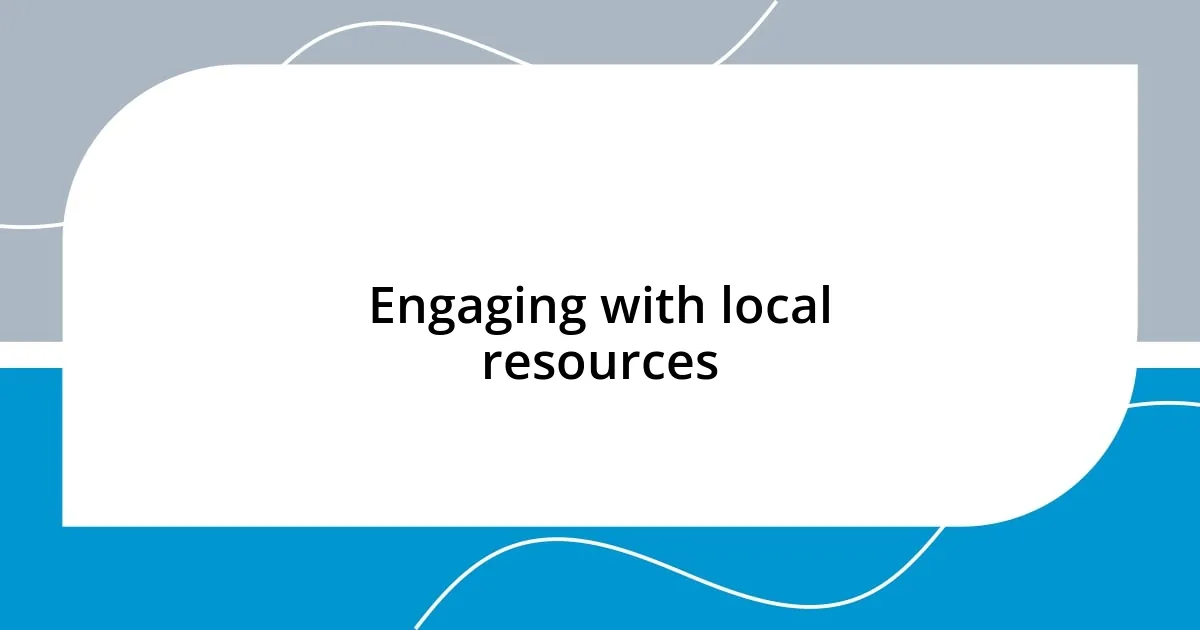
Engaging with local resources
Engaging with local resources can transform your health journey in unexpected ways. I remember my first visit to a community health center, where I discovered local wellness programs tailored to my interests. Meeting those dedicated professionals and fellow community members made me realize how many valuable resources were right at my fingertips. Have you ever wandered into a place that instantly felt like a treasure chest of support?
Joining local exercise classes was another game-changer for me. I recall feeling nervous on my first day at a yoga studio, but the warm welcome I received turned my anxiety into excitement. The instructor not only guided us through poses but also shared valuable insights about mental health benefits tied to physical activity. The friendships I formed in that space created a sense of accountability; we often encouraged each other to show up, both on and off the mat. Have you thought about how local activities could enrich your health network?
Volunteering at health-related events has also connected me to amazing individuals and resources. Participating in a local charity run opened my eyes to various health initiatives in the area. I met a nurse who introduced me to workshops on nutrition and preventative care that I hadn’t known existed. That informal chat ignited a passion for community involvement that continues to motivate my health choices today. What local events have you considered attending to expand your supportive network?
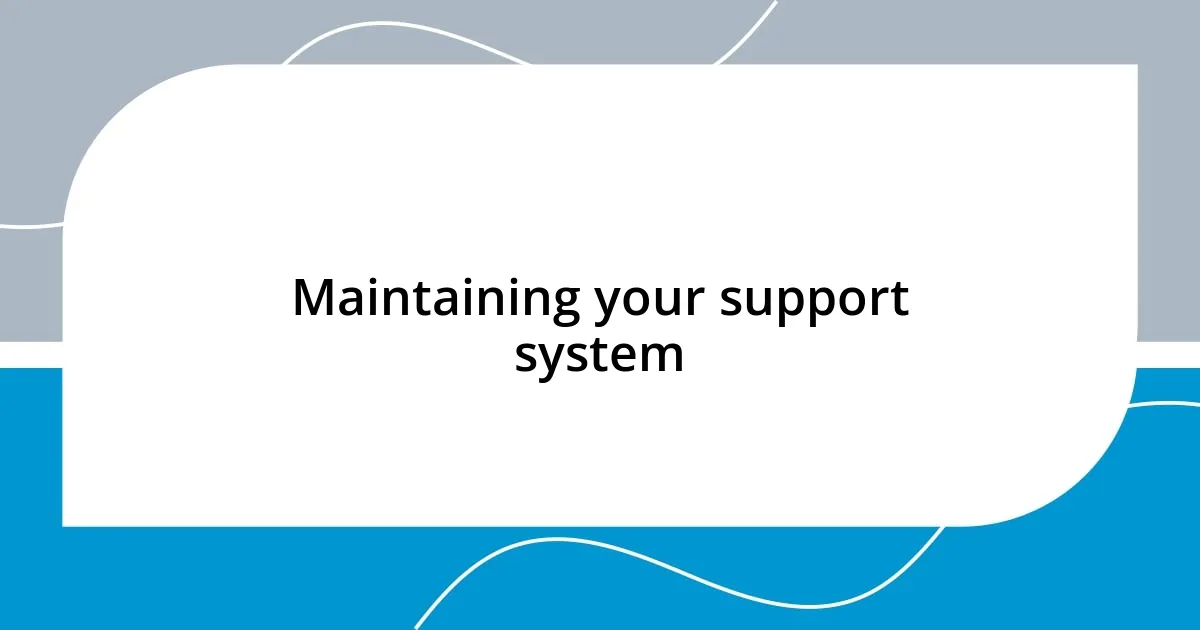
Maintaining your support system
Maintaining your support system requires ongoing effort and communication. In my own experience, I learned that regular check-ins with friends and family can make all the difference. I remember a time when I felt overwhelmed; a simple text chat with a close friend reminded me of the love and understanding that existed around me. Have you reached out to someone lately just to share how you’re doing?
Consistency is key in nurturing these relationships. I found that scheduling monthly get-togethers with my support group kept our connections strong. Even if it’s just a casual coffee catch-up or an online group chat, having that dedicated time allows everyone to share updates and provide encouragement. How often do you carve out time for your circle?
It’s also important to be open and honest about your needs. I recall a phase when I hesitated to share my struggles, fearing it might burden others. But once I began to express my feelings, I was surprised by the flood of support and shared experiences that followed. Have you ever shied away from vulnerability, thinking it might weaken your support? I know from firsthand experience that embracing authenticity can actually strengthen these bonds.
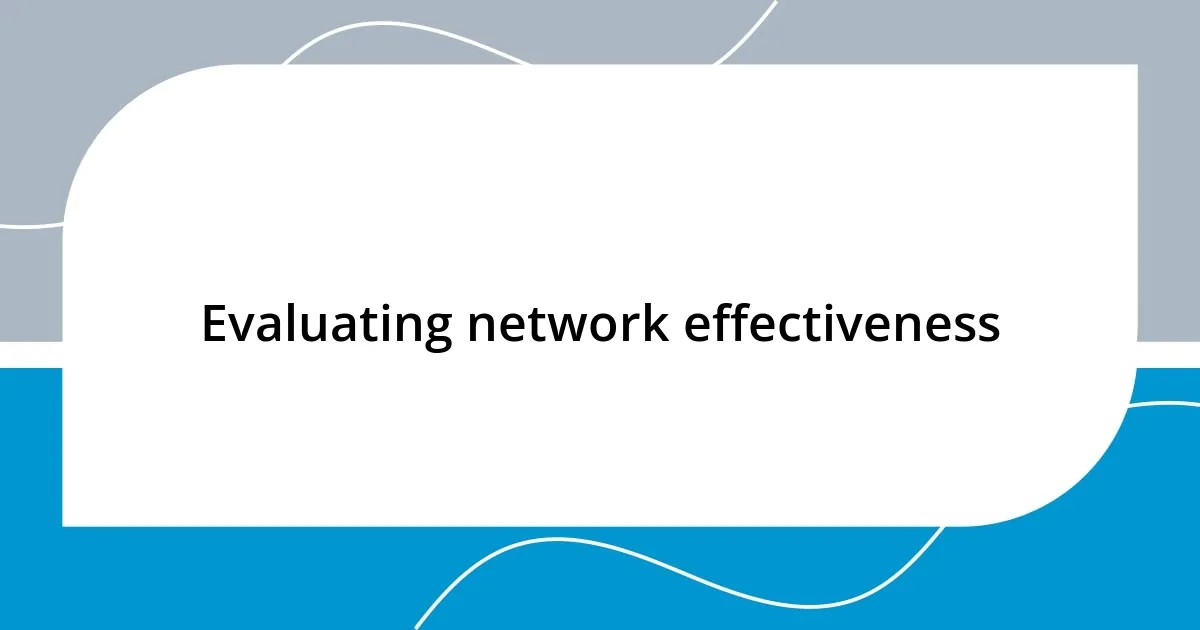
Evaluating network effectiveness
Evaluating the effectiveness of your health network involves more than just looking at the number of contacts; it’s about assessing the quality of those relationships. I distinctly remember a moment when I reflected on my circle after a particularly challenging week. The support I received wasn’t just about what people said, but how they made me feel – understood and uplifted. Have you ever considered whether your connections genuinely resonate with your health goals?
One effective method I found is to regularly assess how my interactions contribute to my well-being. For instance, I set aside time to journal after conversations with my network, noting how I felt and what insights emerged. That practice illuminated patterns – I discovered that certain friends invigorated my spirit, while others left me feeling drained. Isn’t it eye-opening to think that not all support is created equal?
Furthermore, I believe it’s crucial to seek feedback from your network. I once asked a trusted friend for their perspective on my health journey, and their candid insights helped refine my approach. This two-way street not only deepened our connection but also resulted in constructive changes in my habits. Have you thought about inviting your circle to share their thoughts? Taking that step can further enrich the dynamics of your supportive health network.







